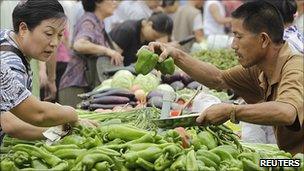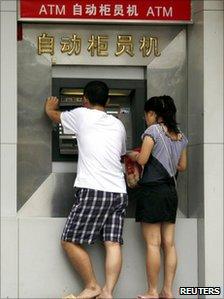Figuring out China's real economic size
- Published

Beijing's central market is a bustling place
Every morning, hundreds of shoppers descend on the open-air fruit and vegetable market near the Workers' Stadium in central Beijing.
It is usually noisy. Stallholders shout out the prices of their produce, laid out on wooden tables or on sheets on the ground.
Money changes hands constantly in what is still a largely cash society. How does the government keep track of all these financial transactions?
It is an important question. New figures suggest China could have just overtaken Japan as the world's second-largest economy.
But how do we know? Can we trust statistics from China, which is not always open and transparent with numbers?
Interviews with market stallholders suggest they do not always declare everything they earn to the Chinese tax bureau.
This implies that China's economy could be bigger than the government believes.
Wang Xiaolu, of the China Reform Foundation, carried out research that supports this idea. He says the hidden economy could be huge.
Methods questioned
Mr Wang checked income and spending patterns in a survey covering 4,000 samples across 19 Chinese provinces.
He estimates that in 2008, the disposable income of urban Chinese households could have been 90% more than the government thought.
Not all economists believe Chinese economic data is completely unreliable, but some question the methods used to collect it.
Wang Tao, head of economic research in China for the bank UBS, said China relied on local governments and businesses to report what they were doing.
"Sometimes it might be in the interests of a locality or a company to over-report what they have done, especially if their boss will then look on them favourably," she said.
There is another problem.
Getting businesses to report was easier when China had a planned economy and there were relatively few sectors in the economy.
It is now more open and capitalist. Individuals can start their own businesses and whole industries can spring up in a short period of time. This makes it difficult for the government to track the economy.
"For example, when the economy is booming, you could have a restaurant set up, but nobody went there and asked them to report," said Ms Wang.
"But when the economy goes bad, maybe they went bust and nobody noticed."
Terms of trade
All this means that the speed of economic growth in China - it grew by 8.7% for the whole of last year - is perhaps exaggerated, but the economy is possibly bigger than estimates suggest.
China's economy could have overtaken Japan's several years ago.

China's economy could be even bigger than thought
Gathering accurate statistics is not just an academic exercise. It helps governments, businesses and individuals make informed financial decisions.
One group of people who need dependable information are individual stock market traders in China.
They gather at small stock trading centres in towns and cities across the country. Citic Securities runs one that is housed in the former home of an imperial princess in Beijing.
Wang Yuxiang has been going there for the best part of a decade to buy and sell shares on China's stock markets.
She is one of dozens of pensioners who spend hours each day watching the centre's electronic notice board report the latest company movements.
Does she trust all economic data and information?
"There's always true and false information - companies are no different. You have to watch a business over a period of time," said the 65-year-old.
The pensioner is particularly wary of state-run companies, because she believes they are unpredictable.
So if Mrs Wang does not trust all China's economic data, how can economists really calculate when China will overtake Japan as the world's second-largest economy?
Wang Tao, of UBS, suggested that perhaps we should not get too fixated with that particular milestone.
"Contribution to world growth matters more than size. From that point of view, China passed Japan quite a while ago," she said.